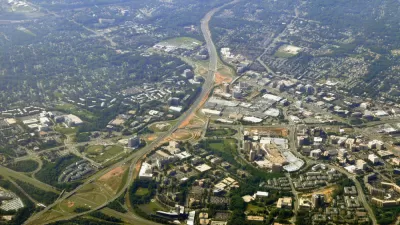On his Per Square Mile blog, Tim de Chant has been kind enough to answer one of mankind's biggest existential questions: What’s more energy efficient, shopping online or in stores?
[W]ith the boom in online shopping for everything from jeans to Jujyfruits, people have grown concerned that e-commerce’s simplicity comes with an environmental price," writes de Chant. "The concern mostly centers around the delivery’s carbon footprint. All those UPS trucks rumbling down every street in American surely can’t be a good thing."
De Chant reviews the findings of a few of the many studies that "have looked at the difference in carbon emissions between items ordered over the internet and those purchased the old fashioned way." And what has he found? "Fret not. Your Amazon delivery probably has a trimmer footprint than a simple trip to the store."
"Why are brick-and-mortar stores so inefficient?" he continues. "It turns out that transporting people to the store to select something and then getting them back home again requires a lot of energy. You also have to consider that items sold in stores were distributed from a central warehouse. When you place an order online, that trip transforms from one to the store to one directly to your home."
FULL STORY: What’s more energy efficient, shopping online or in stores?

Alabama: Trump Terminates Settlements for Black Communities Harmed By Raw Sewage
Trump deemed the landmark civil rights agreement “illegal DEI and environmental justice policy.”

Study: Maui’s Plan to Convert Vacation Rentals to Long-Term Housing Could Cause Nearly $1 Billion Economic Loss
The plan would reduce visitor accommodation by 25% resulting in 1,900 jobs lost.

Planetizen Federal Action Tracker
A weekly monitor of how Trump’s orders and actions are impacting planners and planning in America.

Wind Energy on the Rise Despite Federal Policy Reversal
The Trump administration is revoking federal support for renewable energy, but demand for new projects continues unabated.

Passengers Flock to Caltrain After Electrification
The new electric trains are running faster and more reliably, leading to strong ridership growth on the Bay Area rail system.

Texas Churches Rally Behind ‘Yes in God’s Back Yard’ Legislation
Religious leaders want the state to reduce zoning regulations to streamline leasing church-owned land to housing developers.
Urban Design for Planners 1: Software Tools
This six-course series explores essential urban design concepts using open source software and equips planners with the tools they need to participate fully in the urban design process.
Planning for Universal Design
Learn the tools for implementing Universal Design in planning regulations.
Caltrans
Smith Gee Studio
Institute for Housing and Urban Development Studies (IHS)
City of Grandview
Harvard GSD Executive Education
Toledo-Lucas County Plan Commissions
Salt Lake City
NYU Wagner Graduate School of Public Service




























